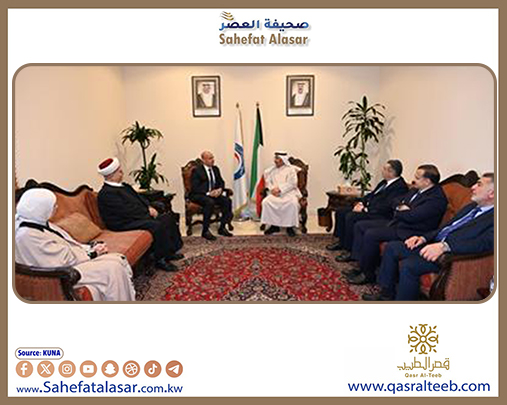


Kuwait Red Crescent Society Chairman Ambassador Khaled Al-Mugames emphasized on Tuesday the importance of cooperation and partnership with various local, regional, and international humanitarian organizations to unify efforts for successful humanitarian work.
Following his meeting with Mohammed Al-Jouzo, Chairman of the Board of Trustees of Lebanon's Zakat Fund, and his accompanying delegation, Ambassador Al-Mugames stated in a press release that Kuwait's diverse efforts in aiding Syrian refugees stem from the directives of His Highness the Amir Sheikh Mishal Al-Ahmad Al-Jaber Al-Sabah (may God protect and preserve him) to extend support to brothers and allies, alleviating their suffering everywhere.
He stressed the necessity of concerted efforts and partnerships among humanitarian organizations to enhance urgent relief operations amid escalating crises, expressing his strong confidence in international organizations, their field missions, and their competent staff in managing projects with the highest level of transparency.
Additionally, he noted that the meeting addressed the humanitarian situation in Lebanon and ways to strengthen joint humanitarian efforts there, reviewing the activities carried out by the Zakat Fund in Lebanon to support those in need.
Ambassador Al-Mugames explained that discussions also explored possibilities for coordination, cooperation, and support for Lebanon, praising the medical, educational, and welfare efforts undertaken to serve their country.
Al-Jouzo Praises Kuwait’s Support
For his part, Al-Jouzo expressed gratitude to Kuwait—its leadership, government, and people—for always standing by Lebanon, emphasizing that it has never hesitated, neither in the past nor today, to assist Lebanon and extend support.
He called for strengthening partnerships with the Kuwait Red Crescent Society, "which shares our goals in supporting education and healthcare," and expanding frameworks for coordination and expertise exchange between the two parties, noting the society's long experience in supporting humanitarian sectors.
Al-Jouzo stated that Lebanon's Zakat Fund targets the most impoverished segments of Lebanese society, reviving the obligation of Zakat, embedding it in the minds and practices of benefactors, achieving social solidarity and humanitarian compassion, and fostering community development.
He added that the Zakat Fund works to launch developmental, charitable, relief, social, health, and cultural programs, ensuring psychological security and social stability for members of society.